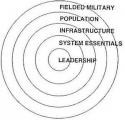With crude oil prices nearing $100 a barrel, there is no end in sight to the redistribution of more than 1 percent of the world's gross domestic product. Earlier oil shocks generated giant shifts in wealth and pools of petrodollars, but they eventually faded and economies adjusted. This new high point in petroleum prices has arrived over four years, and many believe it will represent a new plateau even if prices drop back somewhat in coming months.
"There's never been anything like this on a sustained basis the way we've seen the last couple of years," said Kenneth Rogoff, a Harvard University economics professor and former chief economist at the International Monetary Fund. Oil prices "are not spiking; they're just rising," he added.









Bookmarks